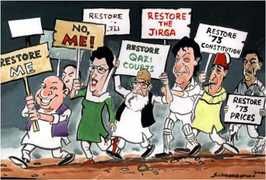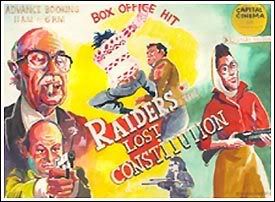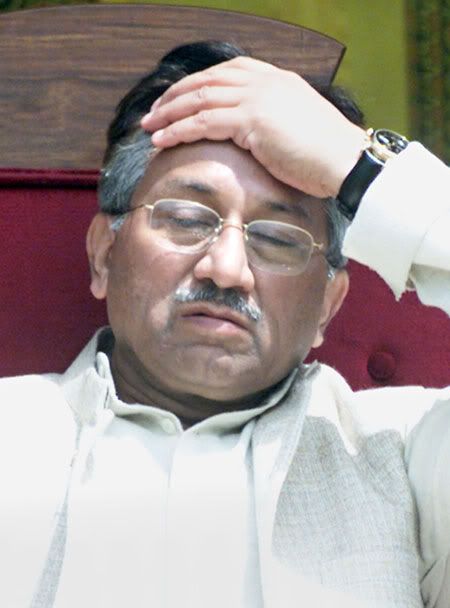Adil Najam
 There has recently been a confluence of murmurs (and shouts) from different quarters that leads one to think that change may be brewing in Pakistani politics.
There has recently been a confluence of murmurs (and shouts) from different quarters that leads one to think that change may be brewing in Pakistani politics.
I am not suggesting that the actual political apparatus in Pakistan is about to change. It might; but probably not just yet. What does seem to be changing, however, is who is talking about democracy and how.
I am a firm believer that democracy cannot be imposed from the outside. It has to be an organic and authentic process that has to be moved by a Pakistani logic and articulated in a Pakistani vernacular (my views on democracy in Pakistan here). Maybe I am letting my optimism get the better of me (and I certainly do not think that we are ‘there’ yet), but it seems that an indigenous logic, demand, and vernacular for meaningful democracy in Pakistan is beginning to take shape and, maybe, maybe, maybe, even catch momentum.
The evidence may be circumstantial, but it is beginning to pile up.
 First, of course, there is the Charter of Democracy. One of the very earliest posts on ATP was on this. I had urged people to at least read what the Charter says (because it says a lot of the right things, I had also said that “even if it is just ‘talk’, talking about democracy can only be good for Pakistan” and that while Ms. Bhutto and Mr. Sharif do not have very credible tack records as champions of democracy, “but even if they happen to be the wrong people to proclaim these sentiments, the sentiments are correct and fully worthy.”
First, of course, there is the Charter of Democracy. One of the very earliest posts on ATP was on this. I had urged people to at least read what the Charter says (because it says a lot of the right things, I had also said that “even if it is just ‘talk’, talking about democracy can only be good for Pakistan” and that while Ms. Bhutto and Mr. Sharif do not have very credible tack records as champions of democracy, “but even if they happen to be the wrong people to proclaim these sentiments, the sentiments are correct and fully worthy.”
Then there was the case of the 2006 APPNA Convention in Chicago that ATP had reported on Imran Khan’s argument for why he had changed his politics regarding the current government; and where — as one of our readers had reported and as others have since commented on (here, here and here) — Chaudhry Shujaat Hussain was not just snubbed but actually booed and where the sentiment was uncharacteristically but unmistakeably anti-establishment and pro-democracy.
Then came an interview with Former Air Chief, Air Marshal (Retd) Noor Khan — a man that most Pakistanis respect as a forthright figure who has shunned pettiness in politics and elsewhere. The interview was published in The Nation (15 July, 2006), but came to me via the blog The Glasshouse:
[Air Marshal (Retd) Nur Khan] demanded an immediate end to Musharraf rule while asking the Punjab’s political leadership to steer the country out of
present political quagmire by withdrawing support to the military ruler… He said the sense of deprivation among the small provinces is getting stronger with each passing day and things have worsened due to the military operations in Balochistan and tribal belt of Waziristan… Former Air Chief said it seems that the present regime has learnt nothing from the mistakes made by the past military governments… He said what worried him the most was the fact that the political system might completely collapse and that would have catastrophic repercussions for the country. He said any such development would have a negative impact on army as well adding that it was high time that the military withdrew itself from politics and went back to the barracks. He said only by restoring genuine democratic order, Pakistan could be put back on the path of progress and development. The real democracy, he added would come to this country when it has independent judiciary and election commission followed by concrete measures to improve the law and order situation.
Then, yesterday, The News (23 July, 2006) reported the following:
Noted poet Ahmad Faraz has returned a prestigious award conferred on him by the government, in response to what he called “denial of In a letter issued to the media on Saturday, Faraz [said]: “… The conferment of an award like the
Hilal-i-Imtiaz is a great honour for any man of letter has always deemed it as such. “However, I have also been concerned that this honour had been shown to me by regime that had denied the people their basic democratic rights. In accepting the award I had hoped that as promised the democratic rights of people would soon be restored,” Faraz observed. Taking umbrage at the actions being taken in Balochistan and Waziristan, the poet said: “Unfortunately, the sanctity of the Constitution and the norms of democratic governance continue to be trampled under the boots. The regime lately has also been fighting the people and shedding their blood. “As I helplessly watch the happenings (in Balochistan and Waziristan) my heart bleeds in pain and anguish but I also nurtured a secret hope that things will soon improve and we will not slip into a situation like 1971” … Digging deep on the reason behind returning the award, Faraz said: “My conscience will not forgive me if I remained a silent spectator of the sad happenings around us.”
Now comes the open letter sent to Gen. Musharraf by 18 prominent public figures. The letter (available here) is worth reading in full. Even more instructive is the list of people who signed it. These include:
Lt Gen Retd Abdul Qadir (Former Governor, Balochistan), Lt Gen Retd Asad Durrani (Former Director General ISI, former Ambassador), Mr Javed Jabbar (Former Senator Former Federal Minister for Information and Broadcasting), Dr Hasan Askari Rizvi (Defence and Political Analyst and former Chairman, Political Science Department, Punjab University), Dr Khalida Ghous (Karachi Univeristy), Lt Gen Retd Moinuddin Haider (Former Governor Sindh and former Federal Minister of Interior), Mujib-ur-Rehman Shami (Editor/Publisher Daily Pakistan, former President Council of Pakistan Newspaper Editors), Senator S.M. Zafar (Former Federal Minister of Law), Mr Sartaj Aziz (Former Foreign Minister/Minister of Finance), Brig Retd Shaukat Qadir (Former Vice President, Islamabad Policy Research Institute, IPRI, Defence Analyst), Mr Shah Mahmood Qureshi, MNA (Former Federal Minister), Lt Gen Retd Talat Masood (Former Federal Secretary, Defence Analyst), Lt Gen Retd S. Tanwir H. Naqvi, (Former Chairman, National Reconstruction Bureau NRB), Mr Shafqat Mahmood (Former Member of Parliament), Dr Parvez Hassan (leading lawyer), Mr Shahid Hamid, Lt Gen Retd Hameed Gul (Former head of ISI), Mr Ahmed Bilal Mehboob (Director PILDAT).
What is noteworthy about this list is that these individuals come from very diverse and divergent political directions. It is, of course, not a surprise, that Sartajis striking that this list would also include people like Lt Gen (retd) Tanvir Naqvi (who was one of Gen. Musharraf’s most trusted advisers when he headed the NRB), Lt Gen Moinuddin Haider (who was a long-serving Interior Minister under Gen. Musharraf), and Sen S.M. Zafar  who is a ruling party Senator and one of the ‘legal architects’ of the current arrangement.
who is a ruling party Senator and one of the ‘legal architects’ of the current arrangement.
Here are some of the things the letter says:
…the state and society of Pakistan today face serious challenges to internal cohesion and stability. Despite the existence of elected legislatures and the prospects of the next elections, there is a deficit of trust and credibility that marks virtually all political relationships. Increasing polarisation reflects the dangerous forces for exclusion and dominance… The elections scheduled for 2007 will not be credible without neutral and impartial care-taker governments, both at the Centre and in the Provinces… Combining the Presidency with the office of Chief of Army Staff politicizes the latter post as well as the Army. Democracy can only be authentic when there is real separation of powers and when all institutions of the State abide by the roles assigned to them by the constitution… We appeal to all to refrain from taking extremist positions and from making threats and charges against each other. At this time in Pakistan’s history, the nation deserves great visions and largeness of heart to secure a better, more just and harmonious future for all.
Then, of course, there is also the external pressure — especially from the US — which seems to be pushing the Musharraf government towards what Husain Haqqani has called “the ‘Friends not Masters’ phase” of relations with the US. His conclusion is that: “Pakistan will attain independence, sustainable strength and real development only when the Pakistani people, and not a Vice-regal elite, determines its fate… A free, fair and transparent election in 2007 is Pakistan’s need.”
 So, what does all of this mean. As veteran journalist Ahmed Rashid points out in a special op-ed for BBC (thanks to the blog Watandost for this link), Gen. Musharraf now has ‘crisis on all fronts.’ That is probably true. Most people will point out, rightly, that all of the above suggests that there is a rapid waning of support for Gen. Musharraf, even amongst those who have earlier given him the benefit of the doubt.
So, what does all of this mean. As veteran journalist Ahmed Rashid points out in a special op-ed for BBC (thanks to the blog Watandost for this link), Gen. Musharraf now has ‘crisis on all fronts.’ That is probably true. Most people will point out, rightly, that all of the above suggests that there is a rapid waning of support for Gen. Musharraf, even amongst those who have earlier given him the benefit of the doubt.
But that is not the point of this post. My point, which I believe is a larger and more important one, is that in each of these interventions a logic for democracy is being constructed and presented. And for most part it is an internal, Pakistani logic. Indeed, my fear is that if this logic is high-jacked by external actors it will only derail the momentum of those who are pushing internally for democracy.
It is the internal demand, the indigenous logic, and the Pakistani vernacular of democracy that is to be celebrated. I doubt if Gen. Musharraf is likely to take advice from me. But if we were listening, I would suggest to him that he should pay close attention to this vernacular. Even more so than to demands for democracy coming from abroad. If he were to do so, Gen. Musharraf still has the opportunity to dramatically change how history shall view him and also, much more importantly, the history of the country.
(All cartoons are from The Friday Times).



















































Look, i go with the lesser of three evils. Mr Musharraf however undemocratic he might be, is 100 times better than NN and BB. Whatever happens, we must not let NN or BB get back into looting the country. I wish Mr Musharraf had done more for the betterment of the people. At the end of the day, F16s don’t get food in your stomach.
@ Aziz Akhmad, you don’t let the scorpion bite you from the same hole. BB and NN are snakes that even if they become one, they still remain the same. Ever listened to how NN tasks? he doesn’t even make sense!! and BB, all i hear from her is anti-Pakistan bullshit. Forget about MMA, we don’t want Taliban in power. So our best bet is Musharraf and that’s who i will vote for.
I agree that people in Pakistan are craving for democracy more than ever
For me the most amazing thing is to note the names of 18 people who are signatories to current letter to the president. Most surprising for me were the names of Tanveer Naqvi, Moinuddin Haider and Javed Jabbar. All of these guys were in the fore-front with the President few years ago.
Hameed Gul has personal agenda. He wants to be a leader but has no following or credibility :) He is playing the role that Nawabzada Nasrullah used to play i.e. ‘mukhalfat bara-i-mukhalfat’ .
I don’t remember if Ahmed Faraz ever ever said anything in support of Pakistan. A great poet he may be, but I don’t consider him a patriot.
A good post Adil bhai. you provided good food of thought.
I AGREEE WITH AZIZ THAT WE HAVE TOO MUCH CYNICISM. I CAN SEE THAT THE MOOD IN PAKSTAN IS CHANGING FAST. I THINK POPLE ARE REALIZING THAT DEMOCRACY GIVES THEM CONTROL AND HAS TO COME BACK
I think there is too much cynicism in our country. Why can’t we just believe that the letter writers are a bunch of well-intentioned people who joined the present administration or were supportive of it thinking, like many of us in the beginning, that this could be the beginning of a new era — an era of enlightenenment. But when they found that “Woh intezar tha jis ka yeh woh sahar tau naheen …” they were disillusioned and left or were asked to leave.
The hot rumor in Pakistan is that this letter is really written by Musharraf’s team as a mweans to split the opposition and to provide a face saving way for Musharraf to resolve the uniform controversy.